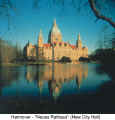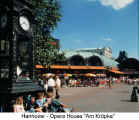
Germany presents
The World's Ways of the Future at EXPO 2000 Hannover
Close to 200 Participants Join in an Exhilarating Journey Into the 21st
Century
Humankind-Nature-Technology is the theme of EXPO 2000, the new millennium’s world exposition taking place June 1 through October 31 in Hannover. In addition to colourful pavilions and an ongoing culture and events program, EXPO 2000 is the platform for close to 200 countries and international organizations, exploring global solutions to third millennium challenges. Unequalled to date in its size and global approach, the 300,000-square-foot Thematic Area is comprised of eleven exhibitions. Visitors can explore problem-solving concepts through spectacular simulations designed to encourage new approaches, and to generate confidence in our planet’s future. Below is a sampling of the dramatic, mind-probing exhibits that await visitors at EXPO 2000.
 Both
past and future concepts of utopia are explored in the World of Visions
exhibit, designed by Belgian artist François Schuilten in cooperation with
IBM. Latest technologies portray how positive visions of the future can
change the world. A highlight of the multimedia presentation is a mythical
temple complex where people stroll along a bridge leading through a panorama
of illuminated lakes shrouded in mystical darkness. Images of ancient
entities rise from the waters and segue to visions of paradise. Visitors
then arrive at the Forest of Miniatures to encounter representations of
individuals whose ideas and deeds changed humanity over the last 1,000
years.
Both
past and future concepts of utopia are explored in the World of Visions
exhibit, designed by Belgian artist François Schuilten in cooperation with
IBM. Latest technologies portray how positive visions of the future can
change the world. A highlight of the multimedia presentation is a mythical
temple complex where people stroll along a bridge leading through a panorama
of illuminated lakes shrouded in mystical darkness. Images of ancient
entities rise from the waters and segue to visions of paradise. Visitors
then arrive at the Forest of Miniatures to encounter representations of
individuals whose ideas and deeds changed humanity over the last 1,000
years.
Onward to the year 2100 and the Museum of the 21st Century, where displays range from the familiar to the delightfully weird. A peek into the future, four different settings representing four cities on different continents reveal how people will live in the new century.
The way we will communicate in the future is illustrated in the various rooms of the Knowledge, Information, Communication exhibit. Visitors at EXPO 2000 can get a first look at the thrilling developments in the world of media - in man-to-machine communication and other areas revolutionized by the microchip.
 Displays
in the Environment: Landscape, Climate area begin with a journey
through images of gushing springs and roaring waterfalls, leading to
examples for feasible solutions that insure our ecological future from the
Living Lakes project. Highlights include models of lakes on four continents,
including Mono Lake in the United States and Lake Constance in Germany, that
are managed ecologically by following nature’s patterns. Displays also
include solar-powered boats and modem water-saving technologies.
Displays
in the Environment: Landscape, Climate area begin with a journey
through images of gushing springs and roaring waterfalls, leading to
examples for feasible solutions that insure our ecological future from the
Living Lakes project. Highlights include models of lakes on four continents,
including Mono Lake in the United States and Lake Constance in Germany, that
are managed ecologically by following nature’s patterns. Displays also
include solar-powered boats and modem water-saving technologies.
In the Humankind area, visitors can trace the nature of our species through ‘genetic landscapes’ with displays created by neuroscientists, past spaces of goodness and sites of evil. Encouraging diversity, Humankind exhibits enable visitors to experience various cultures from around the world and learn about their values. In the Global Village of the Basic Needs area, the same concept gets translated into day-to-day life, with families of different cultural backgrounds demonstrating their idea of a ‘good life’.
Displays in the Mobility department start in the Hall of Wheels. Beginning with the ancient wooden disk, the exhibit leads visitors into a world of virtual mobility possibly replacing today’s traffic jams. Flights into space are also explored, along with such inventions as engines driven by hydrogen fuel cells. The exhibit closes with the Opera of Mobility, in which spectators are dramatically and enjoyably set into motion.
The Future of Work area investigates the world beyond paid employment, where community service, volunteer work and learning will play an increasingly important role in the future. From a high platform overlooking a gigantic arena, visitors can observe several stages on which future models of work from around the world are enacted.
In the Health area, exhibits explore preventing, treating and conquering diseases. Inside a theatre, visitors are immersed in both a real and virtual world of stimulating images to experience how body, soul, spirit and social relationships are intertwined for a healthy way of life.
Energy area displays delve into what keeps us warm and what we should, or should not consume in a world of some ten billion inhabitants and dwindling resources. Here visitors can see many different aspects of energy and its uses. Visitors to the Nutrition exhibit will learn about the world’s peoples’ various types of foods and eating habits, as well as myths and rituals associated with food, whether it be dining on locusts or swearing by a vegetarian diet. Also explored are the fields of genetic engineering and satellite-assisted agriculture to help feed a current 800 million hungry people.
Covering 395 acres on the outskirts of Hannover, EXPO 2000 offers visitors a virtual world tour through an extraordinary assembly of national pavilions in an ecologically conscious setting. Lush green areas and water features lines the roads, paths and open spaces connecting the buildings. Handicappedfriendly, the exposition site is designed for easy wheelchair accessibility. Each day will present internationally renowned stars from a cross section of the performing arts. Fireworks by French pyrotechnics artist Pierre-Alain Hubert will be a nightly treat.
Visitors to Hannover will find themselves well positioned to continue on to other cities in Germany. An hour and a half away by high-speed ICE train is Berlin, Germany’s exciting cosmopolitan capital, or elegant Hamburg, the Hanseatic North Sea port city. EXPO-goers may also want to visit Leipzig, the city of Bach, which is a two and a half-hour train ride away.
Canadians wanting to buy EXPO 2000 tickets may contact Avila Tours in Edmonton, or dial the EXPO 2000 hotline direct in Germany, 011-49-2000. Day tickets may also be purchased in Hannover at the EXPO gate. Weekday tickets are DM 79 (approx. $60) and DM 89 (approx. $68) on weekends. Children’s (ages 6-11) weekday tickets are DM 39 (approx. $30) and DM 49 (approx. $37) on weekends. Rates for students (ages 12-27) and for the handicapped are DM 59 (approx. $45) on weekdays and DM 69 (approx. $53) on weekends. Afternoon, evening, and multiple day tickets are also available. More information on EXPO 2000 is available on the Internet at www.expo2000.de .
For more information on Germany, please contact the German National Tourist Office at 175 Bloor Street East, North Tower, Suite 604, Toronto, Ontario M4W 3R8, or call (416) 968-1570, fax (416) 9681986, or address your e-mail to germanto@idirect.com and check GNTO’s web site at www.germany-tourism.de .
